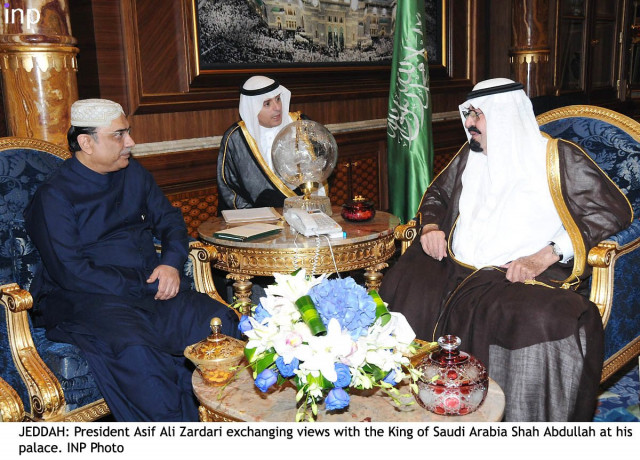Zardari meets Saudi king: ‘Pakistan supports political stability in the Middle East’
Visit follows trip to Iran and Afghanistan, regional security situation discussed.

Within days of meeting with the Iranian leadership in Tehran, President Asif Ali Zardari flew to Jeddah to meet Saudi King Abdullah bin Abdulaziz, in what appears to be an attempt by Pakistan to maintain friendly ties with both Middle Eastern rivals.
The president’s spokesperson, Farhatullah Babar, said that President Zardari was on a two-day trip to Saudi Arabia and would meet with Saudi officials to discuss bilateral ties. The president is accompanied by Interior Minister Rehman Malik, who was also with him on his visit to Iran.
Leaders from the two countries discussed bilateral ties, the security situation in the Middle East and South Asia and the fight against militancy.
President Zardari said that Pakistan favoured political stability in the Middle East and was against the use of violence. His statement appears to be a reference to the recent turmoil in the region that has seen three authoritarian leaders ousted and another three threatened by an increasingly vociferous opposition.
While Pakistan has so far remained unaligned in the unrest, Pakistani private security companies have sent mercenaries to Bahrain in order to assist the government of that country crack down on protestors, much to the chagrin of Iran, which had diplomatically supported the uprising.
The visit to Jeddah comes on the heels of President Zardari’s whirlwind tours of Iran and Afghanistan during which he held series of meetings with Iranian Supreme Leader Ayatollah Khamenei, President Mahmoud Ahmedinejad and Afghan President Hamid Karzai.
Ties between Riyadh and Tehran have been strained since the 1979 revolution in Iran. Pakistan has tried maintaining friendly relations with both countries, though it has not always been successful. Saudi Arabia has, on several occasions, made its displeasure known to Islamabad whenever it felt that Pakistan was drifting too close to Iran.
Before President Zardari left for Tehran on Saturday, he was visited by the Saudi Ambassador to Pakistan, Abdulaziz Ibrahim Al-Ghadeer, a meeting that was made significant by its timing.
Yet President Zardari has, in the past, quietly ignored Saudi protests, attending an anti-terrorism summit in Tehran earlier this year, despite Saudi objections.
As a gesture of goodwill towards Pakistan, Saudi authorities approved the credentials of Pakistan’s new ambassador to the kingdom, Muhammad Naeem Khan, within hours of his arrival in Saudi Arabia on Tuesday.
Later, Saudi Interior Minister Prince Naif Bin Abdulaziz Al Saud hosted a reception in honour of President Zardari.
Published in The Express Tribune, July 21st, 2011.

1724319076-0/Untitled-design-(5)1724319076-0-208x130.webp)

















COMMENTS
Comments are moderated and generally will be posted if they are on-topic and not abusive.
For more information, please see our Comments FAQ